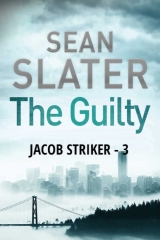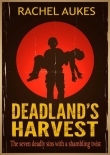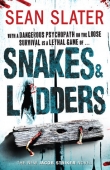
Текст книги "The Guilty"
Автор книги: Sean Slater
Жанры:
Триллеры
,сообщить о нарушении
Текущая страница: 1 (всего у книги 32 страниц)
The Guilty
Sean Slater is the pseudonym for Vancouver Police Officer Sean Sommerville. As a police officer, Sommerville works in Canada’s poorest slum, the Downtown East Side – an area rife with poverty, mental illness, drug use, prostitution, and gang warfare. He has investigated everything from frauds and extortions to homicides. Sommerville has written numerous columns for editorials for the city newspaper. His work has been nominated for the Rupert Hughes Prose Award, and he was the grand-prize winner of the Sunday Serial Thriller contest. His debut novel, The Survivor, was shortlisted for the Arthur Ellis Award.
Also by Sean Slater
The Survivor
Snakes & Ladders

First published in Great Britain by Simon & Schuster UK Ltd, 2013
A CBS company
Copyright © Sean Slater, 2013
This book is copyright under the Berne Convention.
No reproduction without permission.
® and © 1997 Simon & Schuster Inc. All rights reserved.
The right of Sean Slater to be identified as author of this work has been asserted by him in accordance with sections 77 and 78 of the Copyright, Designs and Patents Act, 1988.
Simon & Schuster UK Ltd
1st Floor
222 Gray’s Inn Road
London WC1X 8HB
www.simonandschuster.co.uk
Simon & Schuster Australia, Sydney
Simon & Schuster India, New Delhi
A CIP catalogue record for this book is available from the British Library
Trade Paperback ISBN: 978-1-47110-136-6
Ebook ISBN: 978-1-47110-138-0
This book is a work of fiction. Names, characters, places and incidents are either a product of the author’s imagination or are used fictitiously. Any resemblance to actual people living or dead, events or locales is entirely coincidental.
Typeset by Hewer Text UK Ltd, Edinburgh
Printed and bound in Great Britain by CPI Group (UK) Ltd, Croydon, CR0 4YY
This book is dedicated to two people who shared my childhood and helped make it such a magical time.
To Billy,
who I gave an airplane ride into a tree.
I am sorry for that (not really).
And to Cindy,
whose Barbie dolls I drowned in the bathtub too many times to count.
I’m sorry for that, too (again, not really).
Contents
Part 1: Fuse
Wednesday: One
Two
Three
Four
Five
Six
Seven
Eight
Nine
Ten
Eleven
Twelve
Thirteen
Fourteen
Fifteen
Sixteen
Seventeen
Eighteen
Nineteen
Twenty
Twenty-One
Twenty-Two
Twenty-Three
Twenty-Four
Twenty-Five
Twenty-Six
Twenty-Seven
Twenty-Eight
Twenty-Nine
Thirty
Thirty-One
Thirty-Two
Thirty-Three
Thirty-Four
Thirty-Five
Thirty-Six
Thirty-Seven
Thirty-Eight
Thirty-Nine
Forty
Forty-One
Part 2: Spark
Thursday: Forty-Two
Forty-Three
Forty-Four
Forty-Five
Forty-Six
Forty-Seven
Forty-Eight
Forty-Nine
Fifty
Fifty-One
Fifty-Two
Fifty-Three
Fifty-Four
Fifty-Five
Fifty-Six
Fifty-Seven
Fifty-Eight
Fifty-Nine
Sixty
Sixty-One
Sixty-Two
Sixty-Three
Sixty-Four
Sixty-Five
Sixty-Six
Sixty-Seven
Sixty-Eight
Sixty-Nine
Seventy
Seventy-One
Seventy-Two
Seventy-Three
Seventy-Four
Seventy-Five
Seventy-Six
Seventy-Seven
Seventy-Eight
Seventy-Nine
Eighty
Eighty-One
Eighty-Two
Eighty-Three
Eighty-Four
Eighty-Five
Eighty-Six
Eighty-Seven
Eighty-Eight
Eighty-Nine
Ninety
Ninety-One
Ninety-Two
Part 3: Detonation
Friday: Ninety-Three
Ninety-Four
Ninety-Five
Ninety-Six
Ninety-Seven
Ninety-Eight
Ninety-Nine
One Hundred
One Hundred and One
One Hundred and Two
One Hundred and Three
One Hundred and Four
One Hundred and Five
One Hundred and Six
One Hundred and Seven
One Hundred and Eight
One Hundred and Nine
One Hundred and Ten
One Hundred and Eleven
One Hundred and Twelve
One Hundred and Thirteen
One Hundred and Fourteen
One Hundred and Fifteen
One Hundred and Sixteen
One Hundred and Seventeen
One Hundred and Eighteen
One Hundred and Nineteen
One Hundred and Twenty
One Hundred and Twenty-One
One Hundred and Twenty-Two
One Hundred and Twenty-Three
One Hundred and Twenty-Four
One Hundred and Twenty-Five
One Hundred and Twenty-Six
One Hundred and Twenty-Seven
Part 4: Shockwave
Saturday: One Hundred and Twenty-Eight
One Hundred and Twenty-Nine
One Hundred and Thirty
One Hundred and Thirty-One
One Hundred and Thirty-Two
One Hundred and Thirty-Three
One Hundred and Thirty-Four
One Hundred and Thirty-Five
One Hundred and Thirty-Six
One Hundred and Thirty-Seven
One Hundred and Thirty-Eight
One Hundred and Thirty-Nine
One Hundred and Forty
One Hundred and Forty-One
One Hundred and Forty-Two
One Hundred and Forty-Three
One Hundred and Forty-Four
One Hundred and Forty-Five
One Hundred and Forty-Six
One Hundred and Forty-Seven
One Hundred and Forty-Eight
One Hundred and Forty-Nine
One Hundred and Fifty
One Hundred and Fifty-One
EPILOGUE: One
Two
Three
Acknowledgement Section
Part 1:
Fuse
Wednesday
One
The bomb may have been set to go off in three hours, but the fuse had been lit nine years ago. They had been long years. Hard years. And the notion of it all brooded in the bomber’s mind like a nuclear winter haze.
He knelt on the concrete floor of the steel barn and stared at the woman who was strapped to the chair in front of him. She was attractive. Middle-aged. Dark-skinned. And she was crying softly – had been for damn near an hour now. Mascara-thick tears stained her ebony cheeks.
Her sorrow meant nothing.
He turned his eyes away from the woman. Ignored her sobbing and waffling and suffering. Instead, he focused on the burlap sack, for it was what mattered now. As he opened the bag, the orange light of the barn lamp tinted his face, making his damaged skin look like a dried-up peel. It was a sight to behold, and the gobsmacked woman tied to the chair could not help but stare.
He focused on the strange motley of items he was removing from the bag.
Yellow sponge . . . check.
Micro-tape recorder . . . check.
Red file folder . . . check.
And of course, the toy – a hand-crafted wooden duck, dressed in a policeman’s uniform. That was the essential piece . . . BIG check.
The bomber stared at the toy. The wooden duck was roughly the size of an iron, and had been personified with arms and legs, so that it somewhat resembled a Daffy or a Donald Duck, and not a real one. Painted on its chest was a bright red number 6. The sight of it made the bomber smile sadly. He stuck his finger through the steel O-ring, gave it a pull, and listened to the bird’s voice-box come to life:
‘These criminals are making me quackers!’
The recording ended, and he looked at the duck for a long moment. His smile slipped away, but he did not frown. He did not show any emotion. He just knelt there looking at the wooden duck and feeling overwhelmed by memories – ones which were slanted and out of order.
Like a row of freight train cars that had gone off the tracks.
When his thoughts derailed, he stared at the woman. A strange mix of emotions distorted her face. Confusion. Fear.
Pain.
She choked back her tears. ‘Pl-please. I’ve told you everything. You don’t . . . you don’t have to do this.’
In an instant, his expression changed. Turned dark. And his blue eyes looked like ice under the jagged rim of black hair. When he angled his head to see her, his face looked maniacal in the strange orange hue of the barn lamp.
‘I’m not doing anything,’ he said. ‘You’re the reason for all of this. And you bloody well know it.’
The woman broke down.
He barely heard her sobs. Already he was looking at his watch, going over timelines, analysing strategy. So far, the operation was going well.
Battle One of this long war had started.
Were it not for the fact that he really didn’t want to do this – hell, he didn’t want to hurt anyone – the bomber would have smiled. Because everything was going perfectly well. Spot on without a glitch.
And then the teenage girl stumbled through the first-floor doorway.
And everything went to hell.
Two
Homicide Detective Jacob Striker sat in the driver’s side of the undercover Ford Fusion and sipped from a cup of Tim Horton’s coffee, black. The brew was hot – too hot for the summer heat wave which had moved in late June and was still residing like a bad tenant, halfway through July.
He drank the coffee anyway. Caffeine was needed. It was only five in the morning, and – judging by the heaping mounds of workflow back at the office – the shift was going to be a tedious one.
In the passenger seat, Felicia sat with her visor down, staring at herself in the mirror. Her own cup of coffee, thick with cream and sugar, sat untouched in the pullout tray between them, and that was unusual.
Striker gave her a few more seconds of looking into the mirror, then spoke:
‘Having a staring contest?’
Felicia let out a long sigh and flipped up the visor. She said nothing at first, but Striker knew the problem: Felicia’s birthday was today, and she didn’t like it.
‘Do I look thirty-three?’ she finally asked.
‘No,’ he said. ‘Not any more.’
She cast him a look of daggers, and Striker grinned. After a moment, her expression lightened and she let out a small laugh. ‘Yes, I’m being vain,’ she admitted. ‘But it’s my birthday, so I’m allowed to be. And for the record, any more comments like that one and you’ll be sleeping alone on the couch tonight.’
Striker sipped his coffee and stared back at her. Having a working partnership and a secret relationship was exciting no doubt, but it was also a lot of work. Sometimes it was difficult to tell where the two lines met.
‘Thirty-three,’ he finally said. ‘Hell, I should be so lucky. I crossed that bridge a long time ago.’ He gave her a smile and winked. ‘Don’t fret it, Birthday Girl. You’ll be happy when the day’s done.’
She cocked an eyebrow at him. ‘What’s that supposed to mean?’
‘Little surprise I’ve been working on.’
Felicia gave him a wry look, like she was calling his bluff, but Striker just kept on smiling. He did have something planned – a romantic getaway for two in a quaint little bed and breakfast at Whistler Mountain Ski Resort. The reservation was set for Thursday. Just the thought of getting away brought Striker a sense of peace, and for the first time in as long as he could remember, he felt good.
Really, really good.
Then the call came in.
Sue Rhaemer, the Central Dispatcher for E-Comm, came across the air, her voice smooth yet rough, like sand in honey: ‘Got a 911 coming in,’ she broadcasted. ‘Cell call. Girl’s screaming. Not making a whole lot of sense. Says she’s in the industrial area, somewhere down by the river . . . Keeps talking about two giant chimneys.’
Striker thought it over. ‘The cement plant.’
‘She’s talking about the smokestacks,’ Felicia agreed.
Striker dropped his cup in the tray holder, spilling some of the brew onto the carpet. He rammed the gearshift into Drive and pulled out onto Granville Street. Within seconds, he had the Fusion up to eighty K and was flying through 29th Avenue.
Sue Rhaemer came across the air again: ‘Okay, we’ve lost her now – how close is the nearest unit?’
A patrol unit replied: ‘Alpha 21 – we’re the only car available right now, and we’re coming from Dunbar and 2nd.’
Striker swore. ‘That’s over in Point Grey – they’ll take twenty minutes.’
Felicia grabbed the radio and pressed the mike. ‘This is Detectives Santos and Striker. We’re three minutes out. We’re heading down.’
Striker hammered the gas so hard, Felicia fell back against the seat and almost dropped the mike. As she plunged it back into the cradle, Striker swerved into the fast lane. They raced south down Granville Street, now at over one hundred K per hour, with speeds increasing.
Striker had a bad feeling about the call.
‘Why the hell would a young girl be down by the river – in the industrial area – at this time of the morning?’ he asked.
‘No good reason,’ Felicia replied.
Striker agreed.
He hit the gas and brought the car up to one-twenty.
Three
Factory smoke roamed the black waterways of the Fraser River like lost souls. Where the winds were strong enough, that same smoke spilled back through the pulp mill and concrete plant, blurring out a series of industrial lights so that they looked like distant dim halos.
Striker turned to Felicia. ‘Roll down your window so we can hear – the girl’s got to be close now.’
The words had barely left his lips when a small, awkward figure stumbled out into the centre of the gravel road. Striker hammered on the brakes to avoid hitting her, and the cruiser slid to a stop with the sound of crunching gravel.
He jumped out into the clouds of swirling dust and drew his SIG Sauer. Only when the hard rubber grip of the pistol melded with the firm flesh of his palm did a sense of reassurance filter through him.
They’d found her.
‘Check her out,’ he told Felicia. ‘I’ll cover us.’
The girl was crumpled on the road now, in front of their car. The bright halogen glare of the headlights made her face appear ghostly white and highlighted her long dishevelled hair. She was missing one high-heeled pump, and her short miniskirt and halter top were both torn.
The left side of her face was covered in blood.
‘Jesus,’ Felicia gasped.
She dropped to one knee in front of the girl.
Striker moved in front of them, shielding both with his body as he scanned the smoky haze of the concrete plant and, beyond that, the rumbling waves of the Fraser River. Everything out there was dark. Quiet. Unmoving.
‘Are you okay?’ Felicia asked.
‘He’s after me! He’s after me!’
‘Who’s after you?’
The girl started to cry. She looked back over her shoulder. At the other end of the lot was a small steel barn with an orange exterior lamp. The light looked unnatural in the smoky darkness.
‘He’s got her in there! In the steel barn!’
Striker’s eyes narrowed at the comment, and a coldness spilt through him. He turned around and met the girl’s stare.
‘Got who in there?’
‘Some woman. A black woman – she’s tied to a chair.’ The girl let out a sob. ‘He’s going to kill her.’
Four
The girl’s words ended any hope of waiting for backup.
‘I’m checking it out,’ Striker said. ‘Stay here with the girl.’
Felicia frowned. ‘Forget that – I’m coming with you.’
‘You can’t.’ He gestured to the bloodied girl. ‘You need to protect her until Patrol arrives. She can’t be left alone and she can’t come with me.’
‘Then wait, Jacob. You need cover.’
‘No manpower, no time.’
Before Felicia could fight him on the issue, Striker wheeled about.
As he crossed the lot, the air grew thicker. Loose cement powder and gravel dust floated in the air and stuck to his face. Everywhere he looked, there was only darkness, blurred by the desperate light of industrial lamps.
He rounded a row of cement trucks and the steel barn came back into view. Now at this closer distance, Striker could see that the building was on a separate lot, nestled in between the concrete plant and the Fraser River. Thick blackberry bushes covered the perimeter, and surrounding the lot was a tall chain-link fence.
An odd spot.
Wasting no time, Striker climbed the fence, landed on the other side, and kept moving. When he reached the entrance to the barn, he stopped hard.
The door was half open.
He reached out. Pushed it open. And the hinges squeaked loudly. He looked inside.
The place looked old, long since deserted. All the windows were lined with rusted iron bars and covered with a fine layer of dust. From somewhere up high, a strange white light flickered.
Striker took out his flashlight. Readied his pistol.
‘Vancouver Police!’ he called.
No reply.
‘Is anyone in there?’
When no one answered a second time, Striker made entry. The moment he was inside the barn and out of the doorway, the soft rolling hush of the river faded and was replaced by a heavy silence. There was the strong smell of fuel and oil in the air.
Diesel.
Striker kept moving. He worked his way past several stacks of old tyres and some piles of broken cement bags until he reached a narrow wooden staircase leading to a second level.
He aimed his forty-cal at the top of the stairs and moved slowly up them. The old wood groaned with every step, screaming out a warning to anyone above that he was coming.
Once at the top, the narrow beam of Striker’s flashlight revealed a small square loft with four windows – one on each side. A quick sweep of the flashlight showed that all four corners were empty of threats.
No one was there.
Sitting dead centre in the loft was one empty chair. Striker moved towards it and a bucket of water came into view. There was also a yellow sponge. And an old forklift battery, sitting three feet behind the chair.
As Striker stared at the battery, the wind blew in through the open windows; the wires extending from the terminals touched. The current arced and a quick spark of light flashed through the room.
In the brief illumination, Striker noticed that the wood under the chair was discoloured. At first he thought it was blood, but a closer look suggested it was probably water. Lying in the centre of the stain was a crescent-shaped piece of rubber with one long wire extending from the flatter end.
Oh Jesus.
A darkness washed over Striker as he connected all the items in the room: the steel chair, the water-soaked floorboards, and the battery terminals hinted at much. But the rubber pad with the wires – that was the clincher. It told Striker everything he needed to know.
He was standing in the middle of a torture chamber.
Five
Striker whipped out his cell phone. He was about to call Felicia when a flicker of something caught his eye.
Movement.
He swivelled left and looked out the south-facing window. There, down by the river shore, were the vague outlines of two figures. They were marching eastward through the thin wisps of factory smoke, one ahead of the other.
Striker moved flush with the window for a better look. He aimed his flashlight and pistol at the silhouettes, and called out.
‘Vancouver Police! Don’t move!’
For one brief moment, the two figures stopped. Then the second one turned around. Though faceless in the darkness and fog, this one was taller than the first, and thicker in build.
Definitely a man.
For a moment, the man seemed to be complying. Then he raised his arm and the sharp hard crack of gunfire ripped through the night.
The window shattered.
Instinctively, Striker dove backwards, landing hard on the wooden floor. Shards of glass rained down around him. Bullets punched through the old boards and ricocheted off the iron support beams.
He kept low on his belly. He covered his head, rolled for the stairs, and crawled down to the first level. By the time he hit the concrete, the angry sounds of gunfire had stopped and were replaced by a distant, undulating wail.
Police sirens.
Striker scrambled to his feet and raced outside. By the time he’d made it across the small lot, everything north of Kent Avenue was aglow. Police lights tinted the skyline red and blue.
Striker headed down the trail that led to the river. Along the way, he used his cell to call Felicia. She answered on the first ring.
‘He’s running the river,’ Striker warned.
‘Jesus Christ, Jacob, what the hell was that – gunfire?’
‘Just get containment going. Start up a dog. Call in the chopper.’
He hung up and plunged ahead, keeping his body low with the bramble, making himself as small a target as possible. After one hundred metres, he emerged between two blackberry bushes and stepped down onto river silt.
He looked east, then west. But both ways were empty.
Barren.
‘What the hell?’
The sight made him frown. He’d made it to the shoreline in less than two minutes. No matter which way the two figures had gone, they should still have been visible.
Striker turned his eyes to the river. A summer fog hung overtop the waterway, one thin enough to see through. Visibility was good for a hundred metres at least. If the suspects had fled that way, even in a vessel, he should have been able to spot them.
But the waters were empty.
It made no sense.
He shone his flashlight all around the riverbanks. In one patch of silt, right at the end of the trail, were a set of footprints. They faced east and disappeared after only three steps, where the ground became firmer.
A few metres beyond was a small dock.
Striker approached it. Keeping his gun at the low-ready, he stepped onto the pier and the old planks groaned beneath his one hundred kilos of weight. The entire platform felt unstable. At the end of the dock, on one of the posts, hung a thin rope. Striker moved up to it, then aimed his gun and flashlight into the river below.
Nothing but black water.
The two figures had just . . . vanished.
Frustrated, he was about to head back towards the barn when the beam of his flashlight caught something near his feet.
A gleam.
He knelt down on the dock. Gloved up with latex. And plucked the object from a wooden plank. Turning it over in his hand, he saw that it was a long thin bracelet, made of silver and gold designs. Celtic. Or Gaelic. He wasn’t sure. On the links was a red-brown splatter. He took out his flashlight, and shone it on the links.
Not blood. River muck.
The sight should have filled him with relief, but it did not. No blood meant less evidence for the lab. Less of a trail. Hopefully the barn would provide some decent DNA samples. The forensic techs would have to start processing ASAP.
Striker bagged the jewellery and his cell went off.
He answered. ‘Striker.’
Felicia’s tone was one of relief and anger: ‘Where the hell are you now, Jacob?’
‘Down by the river. They’ve escaped.’
‘Well just watch your back. A dog’s coming down from the south. Chopper’s almost here, too.’
Striker could already hear its distant approach. The rotating blades were like soft thunder cutting the air. One minute, the bird was nowhere to be seen; the next, it rose up over Mitchell Island to the south, and the entire shoreline was flooded in the blinding white glare of a 30-million-candlepower spotlight.
Striker felt his jaw tighten at the sight. The chopper had arrived. So had the dog. With any luck, one of them would find something to go on, because so far the immediate crime scene was offering him zero.
The thought of this hit Striker like a physical force. Left him winded. He had been too slow in reaching the woman. He had failed her. And that failure might have cost the woman her life. It was a fact he had to face.
Sometimes reality could be cold.








